








La Marina Advertiser brings you news and views on local issues in La Marina Urbanisation, La Marina Pueblo and San Fulgencio.
If you have any QUESTIONS for Samantha about local issues, please email Sam on info@lamarinaadvertiser.com










La Marina Advertiser brings you news and views on local issues in La Marina Urbanisation, La Marina Pueblo and San Fulgencio.
If you have any QUESTIONS for Samantha about local issues, please email Sam on info@lamarinaadvertiser.com
with Samantha Hull San Fulgencio Councilor
Answering all your questions about local issues as well as exploring life and culture in Spain as a San Fulgencio local.
I received an email from a lady considering moving to the area with her two children. She was looking for a better understanding of the Spanish education system, as it can seem like a minefield for newcomers. So, here’s a breakdown of how the school system works in Spain.
In Spain, children can start their educational journey at the age of 3 with Educación Infantil (Infant Education). While not mandatory, most children attend, as it provides a foundation for social skills and early learning. The first cycle of Educación Infantil covers ages 3 to 6 and is offered in both public and private schools. This stage focuses on developing basic cognitive, social, and emotional skills through playbased learning and simple academic activities.
At 6, children transition to Primaria (Primary Education), which is mandatory. Primary education lasts six years, from ages 6 to 12, and forms the first compulsory stage of the school system. During this period, students learn subjects such as language, mathematics, science, social studies, and arts. The aim is to build a well-rounded foundation in general knowledge.
After completing Primary Education, students move on to ESO (Educación Secundaria Obligatoria), which is compulsory for all students aged 12 to 16. ESO is divided into four academic years (1st to 4th year). In this stage, students continue their studies in subjects like languages, mathematics, science, history, and physical education. The focus is on


both academic and personal development, preparing students for the next step in their education or work.
At the end of ESO, students take exams that determine whether they can move forward. If they fail a year, they have the opportunity to repeat the year. A student can repeat a year of ESO twice if necessary, giving them a chance to catch up and improve their grades.
After completing ESO, students can choose between two main educational pathways: Bachillerato or Formación Profesional (FP). Both paths are available, but choosing one depends on the student´s future plans.
Bachillerato is a two-year program for students aged 16 to 18, designed to prepare them for university. It is not compulsory, but most students choose to follow it. There are two main types of Bachillerato:
• Bachillerato de Ciencias (Science): Ideal for students planning to study medicine, engineering, or similar fields.
• Bachillerato de Humanidades y
Ciencias Sociales (Humanities and Social Sciences): Best suited for students interested in areas such as law, economics, or social sciences.
Bachillerato also includes subjects like foreign languages, philosophy, and physical education. After completing Bachillerato, students take the EBAU (Evaluación de Bachillerato para el Acceso a la Universidad) exams. The results determine whether they can enter university. If students fail a year during Bachillerato, they can repeat it, but only once.
For students who prefer a more practical route, Formación Profesional (FP) offers vocational education. FP provides specific training in various fields and is available at two levels:
• Grado Medio (Intermediate Level): For students who have completed ESO, this program lasts two years and focuses on professions like healthcare, hospitality, and administration.
• Grado Superior (Advanced Level): Designed for students who have completed Bachillerato or a higher vocational qualification. Grado Superior programs last two years and prepare students for more advanced technical roles.
equip students with practical skills and can lead directly to employment. Students who complete Grado Medio or Grado Superior may also continue their studies at university, depending on the program and their qualifications.
In Spain, university education consists of several stages:
• Grado (Bachelor’s Degree): After completing Bachillerato or Grado Superior, students can apply to university for a Grado. This bachelor’s degree typically lasts four years and offers programs in various fields, from arts and sciences to engineering and humanities. University admission is based on EBAU exam results, although some courses may have additional entry requirements.
• Máster (Master’s Degree): After obtaining a Grado, students can pursue a master’s program. A master´s typically takes one to two years.
• Doctorado (Doctorate): The highest level of education is a doctoral program, focusing on research.
Doctorates generally take three to five years and culminate in a dissertation.
If you have any more questions about the school system or indeed about anything, feel free to reach out via email or at the magazine. I’m happy to help!





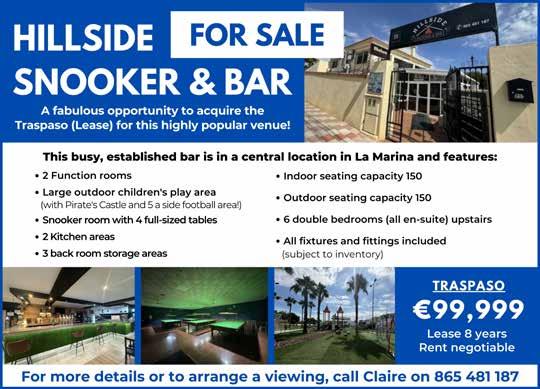



NEW MEMBERS ALWAYS WELCOME! Tuition will be given if required.
RING BARRY ON 641 873 985
Pop in on one of our 'ROLL UP'days - every Tuesday & Thursday
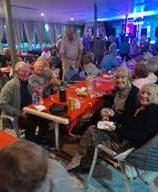
With just a couple of matches left in the winter league, the Monday team who play in the Enterprise Division consolidated their position in the league, and any fear of relegation was put to bed. The Friday team also did very well, and should finish the season in the top half of the table.
Our club competitions are still in progress, with the winners of seven disciplines going forward to the Champion of Champions event being hosted this year by Greenlands club from 6th-14th April. Our own presentation evening took place on Saturday March 22nd.at Pool Bar, with a buffet and Disco.
There´s no respite from league bowling, as the VCL league and summer league commenced at the end of March! .
February also saw more new members, which is excellent!
In the Sports Complex, another great night took place on 15th.February withBowls Club members and others enjoying the popular Jose Bolero, entertaining another full house!
On Saturday 22nd March, we celebrated our Annual Presentation Evening at the Pool Bar, and what a good night it was.
The main winners were: Ladies Singles Champion - Shirley Hadaway,



our retiring club President.
Mens Singles Champion: Barry Roberts.
Ladies Pairs: Janet Parsons & Shirley Hadaway. Men´s Pairs: Garth Slater & Barry Roberts.
Mixed Pairs: Margaret McLaughlin & Garth Slater, Mixed Triples: Lesley Joynes, Dave Joynes & Sue Daniels.
Mixed Rinks: Lesley Joynes, Dave Joynes, Len Daniels & Sue Daniels.
All winners go forward to the Champion of Champions event being held at Greenlands BC between 6th-14th April.
Congratulations to all winners and runners-up!
Our club A.G.M. took place on Tuesday March 25th, a report in next month´s issue.















Clare Fitzpatrick
Stress is a natural part of life, but when it becomes chronic, it can wreak havoc on both your mind and body. Understanding how stress affects you and how to manage it is crucial for your overall well-being. Here’s a quick look at the science of stress and 5 practical tips to help you fight stress and regain control.

When you’re stressed, your brain releases hormones like cortisol and adrenaline, triggering the “fight, flight, or freeze” response. While this is useful in dangerous situations, prolonged stress can keep your brain on high alert, leading to anxiety, exhaustion, and mental burnout.
1. Practice Deep Breathing. Taking slow, deep breaths activates your parasympathetic nervous system, which counteracts the stress response and promotes relaxation. Try the 4-7-8 technique: inhale for 4 seconds, hold for 7, and exhale for 8.
2. Get Moving. Physical exercise helps release endorphins, the body’s natural stress relievers. Whether it´s a brisk walk, a yoga session, or a dance break, moving your body helps reduce stress and improves your mood.

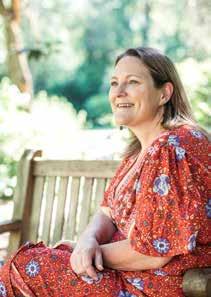
3. Prioritise Sleep. Stress can make sleep harder, but lack of sleep can worsen stress. Aim for 7-9 hours of sleep per night to help your brain and body recover. Establish a calming bedtime routine, like reading or listening to soothing music.
4. Practice Mindfulness. Mindfulness techniques, such as meditation or simple mindfulness exercises, help you focus on the present moment rather than worrying about the future or rehashing the past. Even a few minutes of mindfulness each day can significantly reduce stress.
5. Set Boundaries and Say No. Overcommitting can lead to burnout. Learn to say no when necessary and set healthy boundaries to protect your time and energy. This helps reduce stress and ensures you have space for self-care.
Managing stress is essential for maintaining both your mental and physical health. By incorporating these 5 simple tips into your routine, you can break the cycle of chronic stress and take control of our well-being. Start with small steps, and remember, stress management is a journey - prioritise your health and take one day at a time.
CC Bahia de la Dunas (behind Mercadona) Tel: +34 711 093 378 clare@thehiveholistichub.com www.thehiveholistichub.com



THY WILL BE DONE

Paul Blackmoore (Practice Principal) with little helper Benny, his rescue French Bulldog
I often read on forums that a Will can be organised directly through a notary effectively cutting out the “middle man’’ saving 40€ or so on average against our own fees and this is 100% true as if you are simply looking to save money upfront, going directly to a notary will always be cheaper than using ourselves to produce your legal documents and then paying a notary for their services afterwards.
However, let’s take a minute to remember WHY we are organising a Will for your Spanish estate in the first place –it is to guarantee that your wishes are adhered to AND to ENSURE that your
WHEN YOU DIE IN SPAIN IT’S NOT JUST ABOUT WHAT WILL HAPPEN IT’S ALSO ABOUT WHAT WON’T
beneficiaries have as little hassle and expense and cost as possible once you have died.
Clients of Thy Will Be Done are ASSURED of the following:
1. Their beneficiaries will not need to travel to Spain to arrange an NIE number – our UK office can easily organise this directly with them and the Spanish Consulate;
2. Their beneficiaries will not have to seek out an English-speaking Abogado (solicitor) in Spain and pay for that Abogado to have Power of Attorney to act for them – if we are nominated as executors within a Spanish Will, we will immediately liaise directly with the UK beneficiaries in English and the Spanish authorities in Spanish;
3. Their beneficiaries will not have to pay an unknown amount for Spanish probate to be conducted as our probate fees are guaranteed in advance at just 1.75% + iva of the estate value as standard or even lower at only 1.16%
+ iva if the client has Priority Client Cover in place (just 4.99€ per month with no minimum contract);
4. Their beneficiaries will not have to deal with 2 legal entities, one for the Spanish estate and one for the UK estate as we take care of probate in both jurisdictions seamlessly at the same time.
So, when considering if it’s worth cutting out the middleman you should perhaps consider just one question?
What would your beneficiaries think?
Call us Monday to Friday 9-4 (except red days) on 865 756 058 and a convenient time can be arranged for us to talk through your options either over the phone or (for those clients that are close to our Spanish office in Benijofar) a face to face meeting can be arranged and, our advice is always FREE - you only pay if you engage us to produce your legal documents.
Thy Will Be Done – so your beneficiaries WON’T !




WOW Sue Rogers completed her 829 feet Sky Jump from the Stratosphere in Las Vegas on Tuesday 4th March. Sue was originally due to jump on Sunday the 2nd March but due to high winds all jumps were postponed. When Sue got the chance to complete her jump, she did it not once but twice for DEBRA, Spain.
Sue raised €2,600 in sponsorship donations which she presented to Mary at the DEBRA Charity shop in La Marina. Mary thanked Sue for the donation and congratulated her on this amazing achievement.
DEBRA, Spain would like to send a BIG THANK YOU to Sue and all her supporters for raising awareness and funds for our


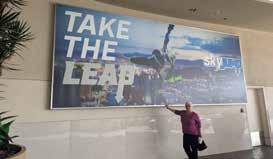
charity. These funds will go towards ensuring our Medical Team are ready at a moment´s notice to go to anyone with EB in Spain.
From all the Butterfly Children and their families, we thank you sincerely as you truly give use wings!




In Spain, with its scorching summers and moderate winters, exterior insulation systems play a vital role in enhancing energy efficiency, indoor comfort, and building longevity. This article explores the characteristics and energy savings of exterior cladding and ThermaCote, two popular systems, and evaluates their impact on buildings and homeowners.
1. Exterior Cladding
Features:
Exterior cladding involves applying thick insulation materials, such as EPS (expanded polystyrene) or mineral wool, to the exterior of a building. It is then covered with a protective plaster layer that shields the structure from the weather.
Energy Savings:
Winter: Up to 30% reduction in heating costs, thanks to its ability to minimize heat loss.
Summer: Limited effectiveness, as extrior cladding tends to trap heat, which can lead to higher cooling costs.
Advantages:
Provides strong thermal insulation in colder seasons.
Improves soundproofing.
Allows for diverse surface designs to enhance building aesthetics.
Disadvantages:
Retains heat, making it less effective in hot climates like Spain.
Complex and labor-intensive installation with higher associated costs.
Prone to moisture issues if improperly installed, leading to potential mold growth.
2. ThermaCote
Features:
ThermaCote is a sprayable ceramic coating that creates a reflective, ultra-thin, multifunctional protective layer. It is particularly effective for addressing the challenges posed by hot climates.
Energy Savings:
Summer: Up to 38% reduction in cooling costs, as it reflects heat and maintains stable indoor temperatures.



Winter: Up to 26% reduction in heating costs, as it retains heat inside the building.
Advantages:
Reflects heat, ensuring significant energy savings during hot summers.
Prevents moisture buildup, reducing the risk of condensation and mold.
Non-combustible, making it safer in fireprone areas.
Quick and easy application, even in tricky areas like around windows and doors.
Lightweight and space-saving, allowing for multiple layers to boost insulation performance.
Environmentally friendly with low emissions and minimal waste.
Disadvantages:
Multiple layers may be required for projects with specific thermal performance demands.
As a newer technology, it might not be as widely available as exterior cladding.
Conclusion: Which is the Best Choice for Spain?
Given Spain´s warm climate, ThermaCote proves to be more suitable due to its focus on heat reflection and moisture control. While exterior cladding excels in colder climates, its heat retention properties are a negative factor in hot regions. For homeowners seeking to reduce energy bills, increase comfort, and adopt a sustainable solution, ThermaCote is a modern and efficient choice. Both systems offer unique advantages, but for Spain´s climate, ThermaCote stands out as the optimal solution due to its energy savings, ease of installation, and adaptability to the specific challenges of the region.
By Rheinhard Schäppi www.schaeppimarina.com
Tel/Whatsapp: +34 633 26 59 94
Email: schaeppi@chaeppimarina.com





Following the decline of the Bronze Age culture of El Argar around 1,500 BC (as discussed in the last edition), the Iberian Peninsula entered a period known as the Early Iron Age. This marked a period of cultural fragmentation and the emergence of new civilisations, such as the Iberians.
The Iberian culture, centered along the Mediterranean coast, heavily influenced the development of the region for centuries, lending its name to what is now known as the Iberian Peninsula.
Unlike the earlier, more centralised Argaric settlements, Iberian villages were smaller and more dispersed, often organised around central communal spaces like sanctuaries or temples. These areas served as hubs for trade, religious ceremonies, and cultural exchanges. The Iberians placed great importance on their religious practices, with sacrifices and offerings dedicated to deities such as Ategina, the fertility goddess.
The practice of cremation was also significant in Iberian burial customs. Upon death, individuals were cremated, and their ashes placed in urns or pits, along with their belongings, such as jewellery, and terracotta pieces representing the gods they worshipped. Large burial monuments were crowned with figures of real animals, like bulls, or by imaginary beasts, such as sphinxes and griffins.
Probably one of the most iconic examples of Iberian art is La Dama de Elche, also known as The Lady of Elche, from much later on in history in the 4th century BC, discovered at the Alcúdia Archeological site. L’Alcúdia is, in fact, the actual location of the earliest Elche settlement, known as Helike, a thriving Iberian city that served as a major hub for trade and military activity. The bust is believed to represent a highstatus woman adorned in ritual attire possibly for ceremonial purposes or as a guardian figure for the deceased.
The Iberian people were typically organised into tribes, each led by a chieftain or tribal leader. The Oretani, for example, held significant power in the Alicante region, particularly through their control of Helike. Although their economy was primarily based on agriculture and livestock farming,

supplemented by hunting and fishing, warfare would become their main activity. These skilled Iberian warriors would later play an important role in historical battles such as during the Punic Wars in which the Oretani would be involved in the death of Hannibal’s father during the battle of Helike. And Iberian tribes would later be annexed to Hannibal’s army as he fought the Romans in the 3rd century BC, embarking on his famous journey over the Alps to conquer Rome. Though we will discuss all this in due course.
Whilst the Iberians were predominant along the Mediterranean coast, Celtic tribes emerged in the Northern and central areas at a later part of the Iron Age. The Celts and Iberians gradually integrated, resulting in the development of Celtiberian culture.
In addition to their military activities, the Iberians were active traders, regularly engaging with the Phoenicians and Greeks, who began to establish thriving coastal trading hubs along the Mediterranean coast. This exchange of goods and ideas significantly influenced Iberian culture, adapting their language, art, and even beliefs.
You can find evidence of Iberian culture here in San Fulgencio. The ruins of the fishing village of El Oral are located just five to ten minutes walk from the Mercadona and Lidl supermarkets. Some of the artefacts uncovered there are displayed at the MARQ museum in
Alicante, along with other examples of Iberian art and weaponry, which were gradually influenced by the Phoenicians over the centuries. And, of course, if you’re a history freak, don’t forget to visit L’Alcúdia- thank me later.






Thus month, dear hooman and doggy readers, I´d like to devote my column to the memory of me and Wendy´s (Wendy is my sister, hoomans, keep up!) Aunty Doreen, a truly beautiful Dachshund and top Aunty!
When we adopted our hoomans and moved here to La Marina to live with our step-mum, Misty the Jack Russell, there was also another doggy living in Misty´s house with her and her pet hoomans. This doggy was Doreen, a fabulous, beuatiful Dachshund, black and tan, big ears and chunky paws and she soon became our Aunty and, even though she was only with us for three doggy years before she passed over The Rainbow Bridge to that which lies beyond, she was truly a fabulous Aunty! She taught us everything we know about being doggies (Misty helped when she could but, bless her, she´s a busy girl with her various business ventures her potato farms back in that place you hoomans call Ingerland, not to mention the Noblett´s chain of fish and chip shops...) and she was always there with a twinkle in her eye and a supportive pat from a chunky dachsie paw if we were upset.
Bark! Doreen really was a great Aunty she was already experienced, she´d previously looked after Misty when she was a pup see the pic .so she knew all there was to know about Auntying. She taught us essential doggy things like cat chasing, ball chasing,





barking, rolling, digging, howling, eating ridiculously fast and how to properly care for our hoomans.
Another amazing thing about Doreen was that she was a doggy aristocrat and her full name was actually Aunty Doreen Von Teckel Dupont Rothschild Windsor Fitzjames Stuart De Alba! She was a descendant of the remarkable Wilhelmina Von Teckel (you, doggy readers, will know who I´m barking about but excuse me while I explain stuff for the hoomans reading, you know how slow they can be, bless them). Wilhelemina was one of Berlin´s leading socialites in 1930´s (hooman time) Berlin (a hooman city apparently), famous for her operatic howling and grace, beauty and wealth. Unfortunately she had a falling out with some powerful hooman bloke (he was also apparently as wicked and evil as a hungry cat in heat!) who was around at the time he was called something like Adilf Hotler. For reasons never explained she decided to give Adilf a good, hard bite in the backside and had to leave Germa-knee (and her aristocratic wealth and privilege) and move to Spayn where she lived her life as a humble chicken farmer – she had many puppies over the years and many, many descendants, one of whom was our Aunty Doreen!
So, hoomans raise a glass to my Aunty and, doggies, chase a cat in her name! Bark!
And just before I go I´m still looking to get puppied up and preggers by a hot Jack Russell bloke so if any of one my doggy readers who fits the bill drop me a line and pic (keep the pics clean, lads) at my barkmail address, Tulisa@barkbark.com



Have you seen a bunch of guys in the park kicking a ball about and thought what? Do you miss the Weekend game with your mates but don’t think you can run for 90 minutes anymore? Or thought about getting out of the house and being a bit more mobile? Then maybe you should consider walking football. Played by both sexes it is for the over 50’s.
Walking football is a great way to meet new friends and to get some exercise. Played with sportsmanship at its heart and without the physical contact of normal football many senior players find it is a new outlet for their talents. Our players are from many different countries including, holiday makers, those who are regular visitors and those who live in and around the La Marina area.
watch or play so feel free to come along!.
For those who want a more competitive game, we are in the local league here on the Costa Blanca. The Spanish National Walking football team is based here on the Costa and residents are eligible. So set your sights even higher!
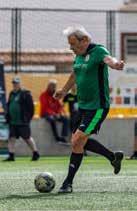
The rules, as the name implies, do not permit running. Many players find it a challenge to fight the urge to run. However when told, that four offences give a penalty to the oposition, they see the incentive to stop and soon learn to control the urge to run. Also with no high balls or tackling from the side and behind the risk of injury is greatly reduced making the game ideal for us oldies.
Los Marineros play at 9.15. Friday mornings at the polideportivo on Calle Azorin on La Marina Urb. Anyone is welcome to
Alongside the monthly Costa Blanca League game we try to arrange friendly games against other local teams, endeavouring to give a competitive game three weeks out of four. With the tournaments that are arranged on the Costa and with visiting teams from across Europe there is a rich selection of games to be had. With each local team hosting a social event after the game or tournament, it gives you a chance to meet others from the surrounding areas.
This Year Spanish Walking Football will host the Cup of Nations with over one hundred teams from all over the world, of both sexes, competing for the Trophies.
La Marina Walking Football
Every Friday at 9.15am at the Polideportivo on Calle Azorinon, La Marina Urb
Find us on Facebook: Los Marineros, La Marina - Walking Football


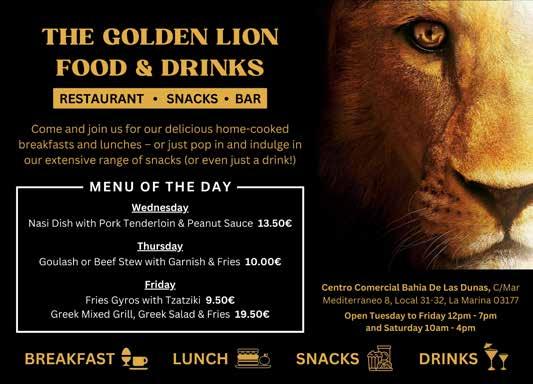

A colloquial expression is a phrase that, taken literally, sounds complete nonsense but which, in fact, everybody knows the meaning of as they are common expressions used in everyday speech –expressions such as ´let the cat out of the bag´..we all know tjat means revealing a truth and has nothing to do with letting cats out of bags! Spanish, like English, has ´bucket loads´ (there you, collloquial expression!) of such expressions. Below are just some of them... the Spanish saying, it´s literal transalation and then the English equivalent. As an added bonus they all feature food or animals!
Tener pájaros en la cabeza.
To have birds in the head
Head in the clouds
Dar gato por liebre.
Give a cat and get a hare
Lost a pound and found a penny
Estar loco como una cabra.
Mad as a goat
Crazy as a box of frogs
Esta como una foca
He/she is a seal
Big as a house
Ser más lento que una tortuga.
As slow as a tortoise
To walk at a snail’s pace
Es un pez gordo.
He/she´s a fat fish
he/she calls the shots
Ser un ratón de biblioteca.
Library mouse
Teacher’s pet
Haber cuatro gatos.
There were four cats there.
Quiet as the grave
No ver tres en un burro.
Seeing three on a donkey
Blind as a bat
Verle las orejas al lobo.
To see the wolves ears
To see the writing on the wall
Estar como un fideo.
He/she is like a noodle
Skin and bones
Con las manos en la masa.
With their hands in the dough
Caught with their hands in the till

Here at La Marina Languages we have been helping many students learning Spanish for the last 4 years. Check out our website and say “hola”.
Christian is based in La Marina and offers one-to-one Spanish lessons at all levels (on-line or face to face). He will also accompany you as a translator for visits to doctors, lawyers, notary – whatever you need!
Tel/Whatsapp: 623 279 074 lamarinalanguages@gmail.com www.lamarinalanguages.com
Ser pan comido.
Like eating bread
Easy peasy
Ajo y agua.
Garlic and water
Deal with it
Ser un chorizo.
He/she is a sausage
Wouldn´t trust him as far as I could throw him.
Las cuentas claras, y el chocolate espeso.
Simple accounts and thick chocolate
Things must be crystal clear
Al pan, pan y al vino, vino.
To bread, bread and to wine, wine
Call a spade a spade
Pedir peras al olmo.
Asking the elm tree for pears
To ask for the Moon
Dar la vuelta a la tortilla.
Turning the omelette
To turn the tables
Vete a freír espárragos.
Go and fry asparagus
Go to hell


It´s been a busy time at La Marina Street Cats as we continue our work as part of the Trap/Neuter.Release scheme for wild cats and finding homes for kittens and cats in need!
We always have cats and kittens looking for homes... recent arrivals include the two beautiful kittens and the two older cats (mother and daughter, both neutered) pictured on this page – if you´re interested in giving them a home sdee my details at the foot of the page.
Also if anyone out there knows of any wild cat colonies, let me know so we can continue our Trap/Neuter/Release work.
We have a fund-event Beetle Drive at Hortons on the 17 th at April at 4pm... please come along!



If you want to know more about La Marina Street Cats or would like to offer a cat or kitten a new home then visit out Facebook group @streetcatsoflamarina or call Whatsapp Lorraine on (+44 7485 585 132).






Hello and welcome to finding out more about La Marina Golf Society Alicante. Our society is made up of golf lovers who mostly live on the Urb in La Marina in Alicante Province on the Costa Blanca.
We have been established for 20 years and we offer a great opportunity for members to show their golfing skills and have fun with others who love golf too. We organise regular golf competitions and social events for our members.
Once a member, you can find out all the latest news and information about our society and its activities on the website. You will find news about the latest competitions and society activities. You can see who has won competitions, check for updates on future events, and hear about what’s going on in our community.
So, if you are interested in joining our society, please get in touch using the Contact Form, available from the website,
and we will send you all the necessary information. Try us out as a guest by emailing lmgsmatchday@gmail.com
We play alternative Thursdays at most courses from Bonalba in the north to Roda to the south.
Our “19th hole” is the Sports Complex which is our venue for fun quiz evenings and many of our social events.
Details of fixtures for 2025 and social events are available on our website lamarinagolfsociety.eu and additional information can be obtained by emailing lamarinagolfsociety@gmail.com


Follow us on Instagram: juanruano.oficial & archiemaddan

Furnishing a new house is always an adventure. For us, it has become a journey not just of aesthetics but of sustainability. Having recently bought a house in the charming town of Biar, we have been on a mission to find second-hand furniture that we can restore or upcycle - an effort to embrace a circular economy and avoid the pitfalls of fast furniture. Alicante province is dotted with flea markets, offering everything from hidden gems to, well, heaps of plastic junk. We had high hopes when we set off for La Nucia’s renowned Sunday market, often touted as one of the largest in the region. Disappointment greeted us instead. No beautiful vintage finds or solid wood furniture waiting for a second life, instead we were met with heaps of cheaply made, disposable goods. The stalls overflowed with tatty plastic items destined for landfill. The visit reinforced what we already knew; modern consumer culture is built on mass production, short life cycles and throwaway habits. We won’t be going back.

ahead of us we decided on an impromptu visit and what a delightful surprise it turned out to be.
But all was not lost! In the distance the silhouette of the nearby town of Polop de la Marina caught our eye. With the whole day
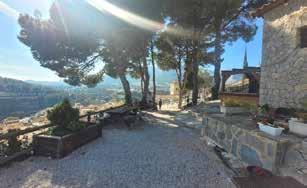
Nestled in the comarca of Marina Baixa, Polop de la Marina lives in the shadow of its more famous neighbours—Benidorm, Finestrat, and the picturesque Guadalest. Yet, what it lacks in name recognition, it more than makes up for in charm, history, and breathtaking views. Our unexpected detour turned into a memorable afternoon because Polop is a town that invites exploration. Winding our way through its narrow streets we understood why this town has been a coveted location for centuries. Its squares and streets, surrounded by handsome townhouses, feel like a step back in time. The famous Font dels Xorrets, with its 221 water spouts, once a vital water source for villagers and travelers alike, flows with water brought from the hills above the town.
We stopped for lunch at Restaurante El Castell, a spot that serves simple yet excellent tapas. What truly sets it apart

is its stunning vantage point. Sitting on the terrace, we were treated to an uninterrupted panorama of the Marina Baixa valley, stretching from the peaks of Aitana to the glistening waters of Altea Bay and Calpe’s iconic Peñón de Ifach. This view alone was worth the trip.
Polop’s history is a microcosm of the entire region’s past.The town´s castle, once a key military outpost, has been witness to a turbulent past. The story of these often painful episodes is told on information boards placed throughout the town. Polop formerly had a large Muslim population reflecting the fact that as late as the 16th century around two thirds of the town’s population was of converted Muslim descent. In 1520, the Moriscos - Muslims who had converted to Christianity - sought refuge within the castle walls during the Germanías rebellion. Under siege by Captain Vicent Peris and his rebels many of the town’s Moriscos perished. In 1609 the Spanish King ordered the complete expulsion of the Moriscos, leading to a significant demographic collapse in the town and region. This shameful episode is often cited as one of modern Europe’s first recorded ethnic cleansings, a type of crime against
humanity that regrettably persists to our own time.
The town’s population did not even begin to recover for over a hundred years. However the town never really recovered its former prosperity, remaining quite isolated and poor until the 1960s. Again, Polop’s subsequent history reflected the wider story of our region: The coming of mass tourism and the economic boom along the coast quickly tripled the population of the town and promoted its economy such that it is now one of the richest communities in Spain, as is clear from the excellent public buildings and services maintained by the local town council.
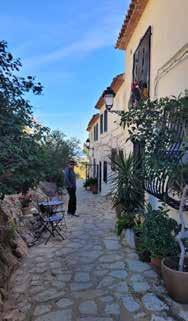
Though our day started with disappointment, it ended in unexpected delight. Our search for sustainable home furnishings may not have been fruitful at La Nucia’s market, but it did lead us to the hidden treasure of Polop de la Marina. If you find yourself in the area, skip the flea market and immerse yourself in the history and beauty of a fascinating town that has quite a story to tell and a few lessons to teach - above all: Never give up, something better may be around the next corner!


Asociacion De Ayuda Necesitado 'Help & assistance where or when necessary'
Race Night Monday 28th April at 6.30pm - Hortons
Fashion Show Thursday 8th May 2.00pm - Charity Shop
Race Night Monday 29th September at 6.30pm - The Chippy

Fashion Show Thursday 9th October 2.00pm - The Shop
Christmas Fair Friday 21st November 2.00pm - Charity Shop
Gala Night Friday 12th December 6.30pm - Hillside
AAN CHARITY | HELPING THE NEEDY OF SAN FULGENCIO & URB. LA MARINA
Facebook Page: @aancharity | Plaza Sierra Castilla 42 | Tel: 634301070 Email: bfmbentley123@gmail.com | CV-01-052195 Cif: G54761226
IN AN EMERGENCY CALL 112
Ambulance, police, fire service
Local Police 696 46 54 81
For local non-emergency issues such as noise control, lost property, non-violent crimes, pet and parking regulations
San Fulgencio Townhall 966 794 201
Urb. La Marina Townhall 966 795 699
Centro Cívico 966 794 517
Tourist Office 966 790 021
24H A&E Hospitals
Elche Public Hospital 966 616 900 Alicante General Hospital 965 933 124
PLUS don't miss the AAN Charity Furniture Sale! Every Thursday 10.30am - 1.00pm at the Catholic Church in La Marina, just past the market on Calle Justo Antonio Quesada. GET YOURSELF SEEN & GET MORE CUSTOMERS ADVERTISE IN THIS SPACE FOR JUST 25€! Call/Whatsapp Richard on¨: 722 453 947 Or for more info email: info@lamarinaadvertiser.com Offering a Trade or Service in the La Marina Area?
British Consulate Alicante 965 21 60 22

1. In which year was the Panama Canal opened?
2. Who is the actress daughter of actress Phillida Law?
3. What are gar, wrasse, alewife and blenny?
4. Who composed the theme music for Jaws ad Star Wars?
5. Which alloy contains 2% antimony, 8% copper and 90% tin?
6. Which son of Henry VII married Catherine of Aragon in 1501?
7. What are Lambda, Omicron and Tau all found in?
8. Which celebrated author lived at Greenway House?
9. Liane Carroll is famous for which type of music?
10. What is a “Futtock”
To solve the puzzle each 3 x 3 box, each row and each column must contain all the numbers 1 to 9. For hints and information visit www.sudoku.org.uk



Extra drying function // HygienePlus function // 3rd tray // AquaStop // Removable top cover

459 €

Multifunction // Oven with grill // 3 cooking zones // 9 power levels // Touch control // Child lock
359 €


The outlet arm guarantees optimal infusion // Optimal infusion temperature between 92 and 96 °C // New "1/2 Jug" functionality

269 €


EURONICS GRAN ALACANT
Centro comercial Gran Alacant Av. Finlandia 23, blq. 3, local 2 03130,Gran Alacant, Santa Pola granalacant@euronics.es
Tel.: 966 69 53 65

ENGLISH SPEAKERS
EURONICS LA MARINA
Pza Sierra Castilla 151, loc. 10 03177, Urb la Marina San Fulgencio lamarina@euronics.es
Tel.: 966 79 77 03
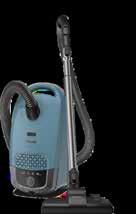

Four power levels // Exceptionally light and compact // AirClean or AirClean Plus filter // Set of three accessories
229 €
EURONICS CIUDAD QUESADA
Centro comercial Consum Av. Salamanca 11, local 8 03170 Ciudad Quesada quesada@euronics.es
Tel.: 966 73 12 11
EURONICS SAN FULGENCIO
Centro com. Bahía del Segura
Calle Mar Jónico 4, local 1, 2 y 3 03177, San Fulgencio sanfulgencio@euronics.es Tel.: 865 760 580
EURONICS LEVANTE







Invest in solar panels and reduce your monthly bills with your trusted expert, Sunrise Energy.
We provide high-quality solar panels for the best energy output. With over 11 years of experience, we offer the best value for money.
Our quotes are tailor-made, fully based on your energy usage, available space, and roof orientation. With a fast installation guaranteed!
Sunrise Energy is here for you in Dutch, Spanish & English.
Switch to sustainable energy and request your free, no-obligation quote today! Your



